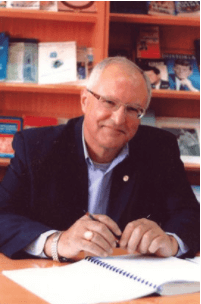
Moderation is not normally thought of as a revolutionary concept, but viewed within the context of the stubbornly intractable conflict between the Israelis and Palestinians, it is precisely that. It is not the militant, extremist voices on either side who are revolutionary.
Their refusal to seek a middle way and their self-serving campaigns to demonize each other only lead to more conflict, not change. It is those who call for moderation and understanding as the basis for a fairly negotiated two-state solution who are the true revolutionaries.
A deep chasm of misunderstanding, distrust, hatred, and enmity separates Muslims, Christians, and Jews in the Holy Land. The question is: Should we stand by and watch that chasm continue to widen, or should we work to bridge it?
If Muslims are taught that Christians and Jews are the enemies of Islam, and Christians and Jews are taught that Islam is a false religion, all bridge building will be futile.
As political and religious radicalism in Palestinian and Israeli societies continue to rise, the question remains: How can we stem this tide to avoid the outbreak of violence in the near future?
Contrary to what you might gather from the news headlines, there is an expanding community of Palestinians whose call for moderation is garnering widespread attention and support under the banner of a movement called Al Wasatia.
I founded Al Wasatia in 2007 with the goal of advocating moderation as the only effective path towards a final, peaceful resolution of the conflict. Pragmatically, such an approach can lead to a compromise solution, but one that will rest on very shaky ground unless it is founded on a sea change in attitudes.
This is what Wasatia is trying to do.
The movement’s name derives from the term wasatan, which appears in a verse in Al Baqarah Surah in the Quran. The word wasatia in Arabic means center and middle. In the Holy Quran it means “justice, moderation, balance and temperance." The word wasat appears in verse 143 of the second chapter, which is 286 verses long, so it appears exactly in the middle.
The verse says: “And We have created you a middle ground (moderate) nation” or “a centrist ummah [community].” The passage demonstrates that the need to be moderate and temperate is a central message within Islam.
Wasatia addresses all aspects of life: the way you eat, the way you dress, the way you spend money. Those of us in the movement interpret this to indicate justice, balance, moderation, middle ground, centrism, and temperance.
In studying other faiths, particularly Judaism and Christianity, it becomes clear that they too uphold the same values, thus offering fertile ground for inter-faith understanding and peaceful co-existence.
But it’s not merely moderation as a religious principle that should replace the radicalizing rhetoric of militant extremists. It is at its core a deeply human principle, a willingness to see those on the other side of the conflict not as “the enemy” but as fellow human beings, shaped by different histories but all looking towards the day when they can live in peace and security.
This belief may seem an incongruous attitude, coming as it does from someone who, as a Palestinian university student in the humiliating aftermath of the 1967 Arab-Israeli War, espoused guerilla warfare as the only possible way to achieve justice for his people.
But then I left to pursue post-graduate studies, first in England and then the United States. It was an enlightening experience. Viewing the situation from a distance and with new knowledge, I came to reject any notion of violence as an answer to the problem.
Later personal experiences strengthened my belief that at a human level, where bigotry and hatred are replaced by moderation, empathy, and understanding, there exists a common desire for peaceful accommodation.
In late 2006, during the month of Ramadan, I observed from the balcony of my house, which overlooked the Dahiet al-Barid/Ram Checkpoint in East Jerusalem, a situation that had the potential to escalate into violent confrontation.
Hundreds of Palestinians from the West Bank were trying to pass into Jerusalem to pray in al-Haram al-Sharif and al-Aqsa Mosque. The Israeli soldiers pushed them back and threw tear gas grenades at them, but to no avail.
I was waiting for gunfire to erupt when quite quickly the volatile standoff appeared to have been defused. I soon discovered that the leading officer had agreed to a compromise.
Buses were arranged to take the Palestinians, who agreed to hand over their ID cards, into Jerusalem to pray. Afterwards the buses brought them back to the checkpoint where their cards were returned.
It struck me as very significant that these Palestinians, religious though they clearly were, favored a negotiated solution. Had they been extremists, they would have escalated the event in the hope of precipitating a violent clash that could then be used to further their narrative of a demonic Israeli enemy.
On their part, the Israelis recognized the Muslim faithful for what they were, religious yet moderate people. This in turn prompted me to ask myself who represents such religious moderates in Palestine and, as a response, to found Al Wasatia.
Shimon the Righteous taught: “On three things does the world stand—on Torah, on divine service, and on acts of kindness [charity].” Wasatia teaches: “On three things does the world stand—on the Holy Books, on divine service, and on acts of voluntarism and kindness [charity].”
Wasatia rejects the view that extremism is the best way or the most authentic Islamic way, quoting Prophet Mohammed saying, “The best way to run affairs is through moderation.”
Wasatia is a movement that advocates achieving peace and prosperity through the promotion of a culture of moderation that would walk away from the current climate of religious and political extremism that escalates fear and violence.
Wasatia claims the centrist position—that balance, between passion and hate, between amity and enmity, between deep despair and false hope, would lead the Middle East out of its chronic conflict and despair.
I believe that part of the religious animosity problem is related to ignorance—both about our own religion and that of the ‘other’. Religion has played a big role in agitating the conflict to date, and I believe it is time that religion becomes a catalyst in resolving it.
Many Muslims don’t know very much about Judaism or Christianity, and what many of them know about Islam is distorted. Interfaith dialogue helps to dispel stereotypical images, myths, and misperceptions. In any conflict, religious peace is a prerequisite for a sustainable political peace.
Achieving our goals will take time, probably a long time, because it involves overcoming the malevolent influence of the religious militants, their distorted interpretation of the Qur’an, and the deeply ingrained attitudes and prejudices thus engendered, particularly among the poor, young, and uneducated.
But it’s no good standing by and doing nothing—not when we are confident that our message of moderation is the key to a much brighter future for all sides.
